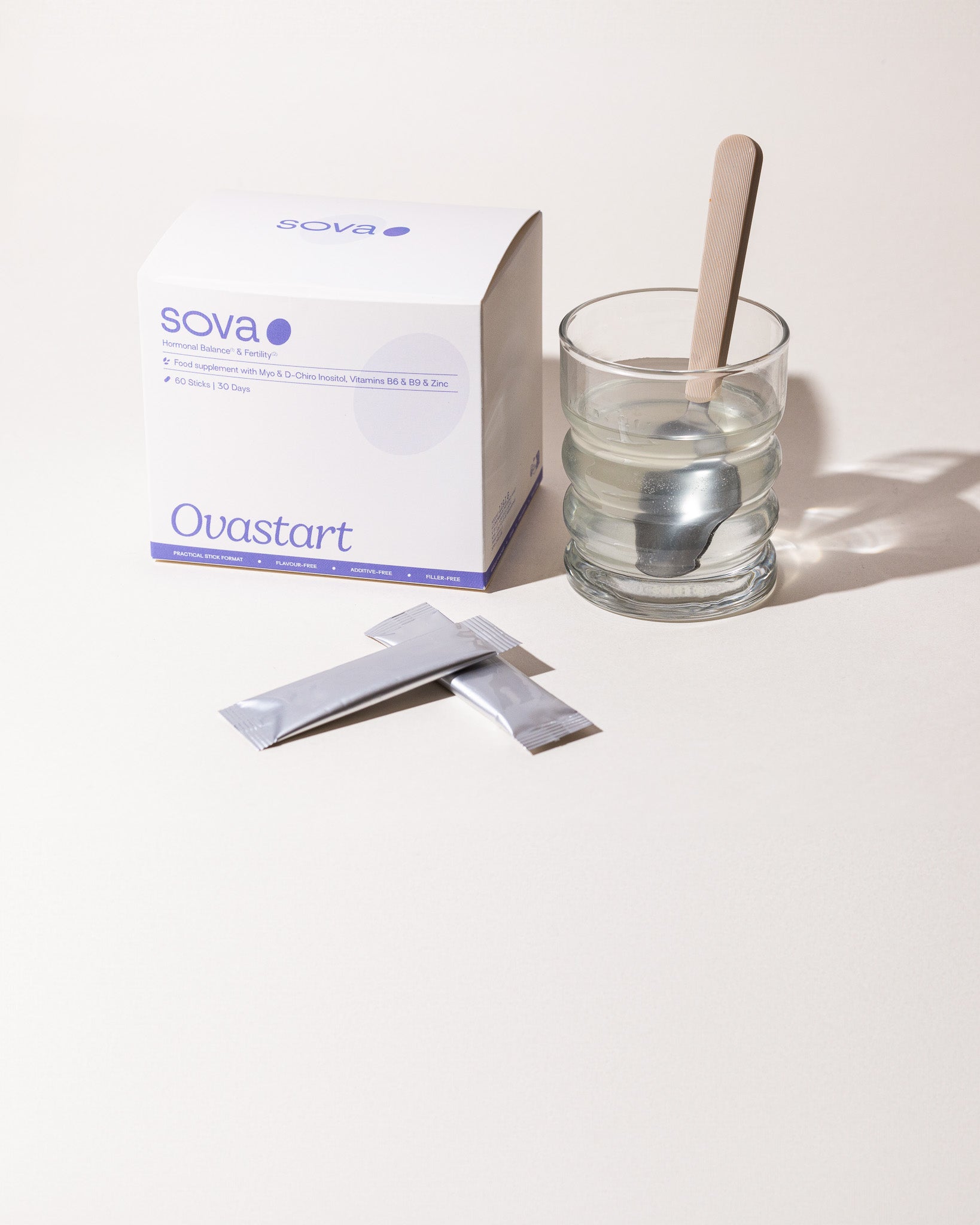Table of contents
- 01. Menopause and PCOS: understanding the connection
- 02. Menopause and PCOS: what happens to your hormones?
- 03. How menopause affects PCOS
- 04. Does PCOS go away after menopause?
- 05. Why menopause can worsen insulin resistance in PCOS
- 06. PCOS, menopause and endometrial cancer: what to know
- 07. Living well through menopause with PCOS
- 08. In summary
Menopause and PCOS: understanding the connection
While PCOS is often discussed in relation to menstrual cycles and fertility, its impact on menopause remains less known. Yet, menopause is an inevitable stage of every woman’s life — one that can come with new challenges, sometimes amplified by PCOS. Among them: metabolic changes, sleep problems, cardiovascular risks, or even reduced bone density.
Explained like that, it may sound worrying — but rest assured, these risks are neither systematic nor inevitable. There are many ways to approach this transition with more serenity. This article aims to help you understand how menopause and PCOS interact, and how to navigate this new hormonal chapter with confidence.
Menopause and PCOS: what happens to your hormones?
Menopause is officially defined as 12 consecutive months without menstruation. It doesn’t happen overnight but follows a gradual hormonal transition known as perimenopause. During these 4 to 10 years, levels of key sex hormones such as oestrogen and progesterone progressively decline.
Common hormonal changes
This hormonal shift can lead to irregular cycles, lighter or heavier bleeding, vaginal dryness, mood swings, poorer sleep quality, and the well-known hot flashes and night sweats. Weight gain, fatigue, and insulin resistance can also appear — symptoms that many women with PCOS are already familiar with.
How menopause affects PCOS
So what happens when someone with PCOS — a condition already marked by hormonal imbalance — enters menopause?
Common PCOS symptoms include:
-
Irregular or absent periods
-
Weight gain or metabolic changes
-
Insulin resistance
-
Excess androgens (like testosterone)
-
Fatigue or tiredness
-
Hair loss or acne
Some of these overlap with menopausal symptoms, which can sometimes delay diagnosis or make the transition harder to interpret.
Does PCOS go away after menopause?
It’s a common belief that PCOS “fades” with age — but research shows that’s not entirely true.
While oestrogen and progesterone levels fall sharply during menopause, androgen hormones (like testosterone and androstenedione) remain present, as they are still produced by the ovaries and adrenal glands.
Studies suggest that hyperandrogenism tends to persist slightly beyond menopause, though often at a lower intensity. Over time, this can mean a gradual decrease in symptoms like acne, hirsutism, or hair loss. However, hormone changes don’t follow a linear pattern — temporary increases in DHEA or DHEAS may occur around perimenopause.
Even if hormonal activity slows down, PCOS does not disappear after menopause. Some symptoms improve, while others — particularly those linked to metabolism — may worsen.
Why menopause can worsen insulin resistance in PCOS
In PCOS, insulin resistance and weight gain are already common. The fall in oestrogen levels that comes with menopause can make these issues more pronounced.
Oestrogens normally help regulate how the body stores fat — favouring peripheral rather than abdominal fat distribution, which is associated with better insulin sensitivity. They also support healthy glucose metabolism.
When oestrogen levels decline, insulin resistance increases, leading to fatigue, cravings, and more difficulty managing weight. This also raises the risk of cardiovascular disease, hypertension, and type 2 diabetes among postmenopausal women with PCOS.
PCOS, menopause and endometrial cancer: what to know
Because PCOS often involves irregular ovulation and prolonged exposure to unopposed oestrogens, it can increase the risk of endometrial cancer.
Menopause itself doesn’t create this risk but can make underlying issues more visible — especially in case of abnormal bleeding after menstruation has stopped.
A medical follow-up is essential to monitor these changes and ensure any warning signs are detected early.
Living well through menopause with PCOS
Although PCOS and menopause can create a double hormonal challenge, lifestyle and preventive care play a major role in easing the transition.
Supporting metabolism and insulin sensitivity
-
Favour a balanced diet rich in fibre, healthy fats and proteins
-
Stay active with a mix of cardio and strength training to support insulin sensitivity and cardiovascular health
-
Limit processed and high-sugar foods that worsen insulin resistance
💡 You can also take our PCOS quiz to discover which supplements best support your hormonal balance.
Managing hair growth and androgen symptoms
Excess facial or body hair (hirsutism) often stems from androgen excess and blood sugar imbalance. To manage it:
-
Keep blood sugar stable through balanced meals
-
Combine movement and rest to reduce stress-related hormonal spikes
-
For additional support, explore supplements like Ovastart, formulated with myo-inositol and key micronutrients to support hormonal balance.
To learn more about excessive hair growth, here’s an article on the most effective solutions for managing PCOS.
Hot flashes, sweating and poor sleep
Hot flashes and night sweats can worsen with PCOS due to blood sugar fluctuations and stress.
Try reducing caffeine, alcohol, and spicy foods, while focusing on stress-management practices like yoga, meditation, or mindful breathing.
To reduce fatigue and improve relaxation, magnesium-based supplements can be helpful.
And if you’re struggling with sleep, explore our article on PCOS and sleep.
In summary
Menopause is a significant hormonal shift — and for women with PCOS, it may come with additional challenges.
But with a proactive approach, balanced nutrition, movement, and the right support, you can ease the transition and protect your long-term health.
At SOVA, we believe knowledge is power: by understanding how your hormones evolve, you can take small, impactful steps towards better balance — at every stage of life.
Scientific references
SOVA was created by two sisters with PCOS who wanted products that truly worked. Our formulas are developed in-house with women’s health and micronutrition experts, using ingredients backed by clinical studies and compliant with European regulations.
- Built by women with PCOS, we know the reality of the symptoms.
- Clinically studied, high-quality ingredients, including patented forms like Quatrefolic® and an optimal Myo-/D-Chiro Inositol ratio.
- Holistic support for hormonal balance, metabolic health, inflammation, mood and cycle regulation.
- Transparent, science-led formulas with no unnecessary additives.















